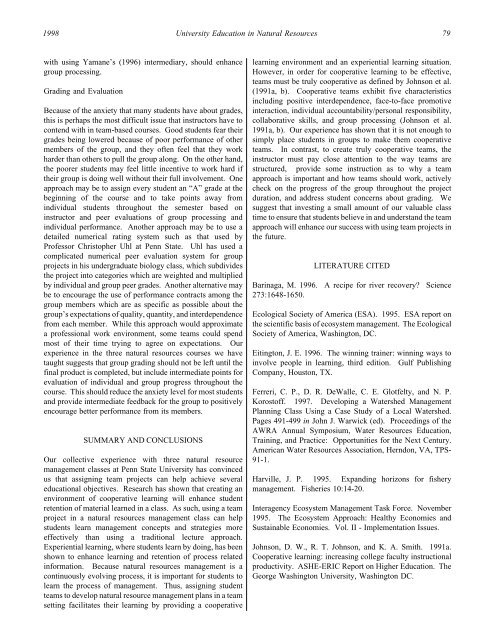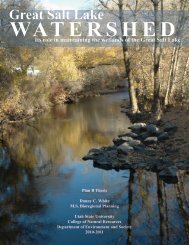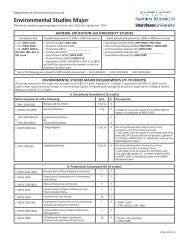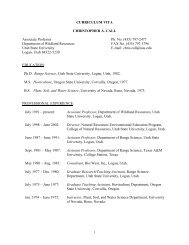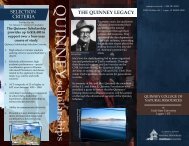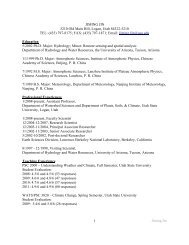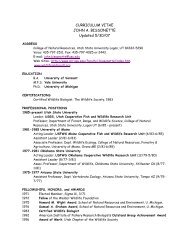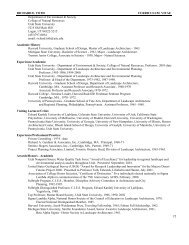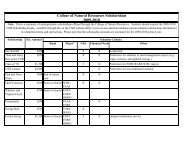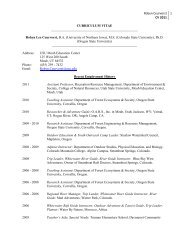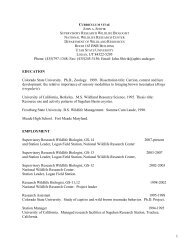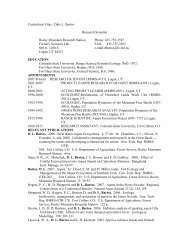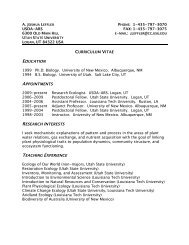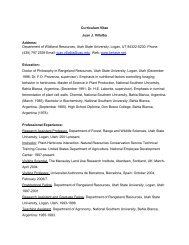University Education in Natural Resources - CNR Home - Utah State ...
University Education in Natural Resources - CNR Home - Utah State ...
University Education in Natural Resources - CNR Home - Utah State ...
Create successful ePaper yourself
Turn your PDF publications into a flip-book with our unique Google optimized e-Paper software.
1998<br />
<strong>University</strong> <strong>Education</strong> <strong>in</strong> <strong>Natural</strong> <strong>Resources</strong> 79<br />
with us<strong>in</strong>g Yamane’s (1996) <strong>in</strong>termediary, should enhance<br />
group process<strong>in</strong>g.<br />
Grad<strong>in</strong>g and Evaluation<br />
Because of the anxiety that many students have about grades,<br />
this is perhaps the most difficult issue that <strong>in</strong>structors have to<br />
contend with <strong>in</strong> team-based courses. Good students fear their<br />
grades be<strong>in</strong>g lowered because of poor performance of other<br />
members of the group, and they often feel that they work<br />
harder than others to pull the group along. On the other hand,<br />
the poorer students may feel little <strong>in</strong>centive to work hard if<br />
their group is do<strong>in</strong>g well without their full <strong>in</strong>volvement. One<br />
approach may be to assign every student an “A” grade at the<br />
beg<strong>in</strong>n<strong>in</strong>g of the course and to take po<strong>in</strong>ts away from<br />
<strong>in</strong>dividual students throughout the semester based on<br />
<strong>in</strong>structor and peer evaluations of group process<strong>in</strong>g and<br />
<strong>in</strong>dividual performance. Another approach may be to use a<br />
detailed numerical rat<strong>in</strong>g system such as that used by<br />
Professor Christopher Uhl at Penn <strong>State</strong>. Uhl has used a<br />
complicated numerical peer evaluation system for group<br />
projects <strong>in</strong> his undergraduate biology class, which subdivides<br />
the project <strong>in</strong>to categories which are weighted and multiplied<br />
by <strong>in</strong>dividual and group peer grades. Another alternative may<br />
be to encourage the use of performance contracts among the<br />
group members which are as specific as possible about the<br />
group’s expectations of quality, quantity, and <strong>in</strong>terdependence<br />
from each member. While this approach would approximate<br />
a professional work environment, some teams could spend<br />
most of their time try<strong>in</strong>g to agree on expectations. Our<br />
experience <strong>in</strong> the three natural resources courses we have<br />
taught suggests that group grad<strong>in</strong>g should not be left until the<br />
f<strong>in</strong>al product is completed, but <strong>in</strong>clude <strong>in</strong>termediate po<strong>in</strong>ts for<br />
evaluation of <strong>in</strong>dividual and group progress throughout the<br />
course. This should reduce the anxiety level for most students<br />
and provide <strong>in</strong>termediate feedback for the group to positively<br />
encourage better performance from its members.<br />
SUMMARY AND CONCLUSIONS<br />
Our collective experience with three natural resource<br />
management classes at Penn <strong>State</strong> <strong>University</strong> has conv<strong>in</strong>ced<br />
us that assign<strong>in</strong>g team projects can help achieve several<br />
educational objectives. Research has shown that creat<strong>in</strong>g an<br />
environment of cooperative learn<strong>in</strong>g will enhance student<br />
retention of material learned <strong>in</strong> a class. As such, us<strong>in</strong>g a team<br />
project <strong>in</strong> a natural resources management class can help<br />
students learn management concepts and strategies more<br />
effectively than us<strong>in</strong>g a traditional lecture approach.<br />
Experiential learn<strong>in</strong>g, where students learn by do<strong>in</strong>g, has been<br />
shown to enhance learn<strong>in</strong>g and retention of process related<br />
<strong>in</strong>formation. Because natural resources management is a<br />
cont<strong>in</strong>uously evolv<strong>in</strong>g process, it is important for students to<br />
learn the process of management. Thus, assign<strong>in</strong>g student<br />
teams to develop natural resource management plans <strong>in</strong> a team<br />
sett<strong>in</strong>g facilitates their learn<strong>in</strong>g by provid<strong>in</strong>g a cooperative<br />
learn<strong>in</strong>g environment and an experiential learn<strong>in</strong>g situation.<br />
However, <strong>in</strong> order for cooperative learn<strong>in</strong>g to be effective,<br />
teams must be truly cooperative as def<strong>in</strong>ed by Johnson et al.<br />
(1991a, b). Cooperative teams exhibit five characteristics<br />
<strong>in</strong>clud<strong>in</strong>g positive <strong>in</strong>terdependence, face-to-face promotive<br />
<strong>in</strong>teraction, <strong>in</strong>dividual accountability/personal responsibility,<br />
collaborative skills, and group process<strong>in</strong>g (Johnson et al.<br />
1991a, b). Our experience has shown that it is not enough to<br />
simply place students <strong>in</strong> groups to make them cooperative<br />
teams. In contrast, to create truly cooperative teams, the<br />
<strong>in</strong>structor must pay close attention to the way teams are<br />
structured, provide some <strong>in</strong>struction as to why a team<br />
approach is important and how teams should work, actively<br />
check on the progress of the group throughout the project<br />
duration, and address student concerns about grad<strong>in</strong>g. We<br />
suggest that <strong>in</strong>vest<strong>in</strong>g a small amount of our valuable class<br />
time to ensure that students believe <strong>in</strong> and understand the team<br />
approach will enhance our success with us<strong>in</strong>g team projects <strong>in</strong><br />
the future.<br />
LITERATURE CITED<br />
Bar<strong>in</strong>aga, M. 1996. A recipe for river recovery? Science<br />
273:1648-1650.<br />
Ecological Society of America (ESA). 1995. ESA report on<br />
the scientific basis of ecosystem management. The Ecological<br />
Society of America, Wash<strong>in</strong>gton, DC.<br />
Eit<strong>in</strong>gton, J. E. 1996. The w<strong>in</strong>n<strong>in</strong>g tra<strong>in</strong>er: w<strong>in</strong>n<strong>in</strong>g ways to<br />
<strong>in</strong>volve people <strong>in</strong> learn<strong>in</strong>g, third edition. Gulf Publish<strong>in</strong>g<br />
Company, Houston, TX.<br />
Ferreri, C. P., D. R. DeWalle, C. E. Glotfelty, and N. P.<br />
Korostoff. 1997. Develop<strong>in</strong>g a Watershed Management<br />
Plann<strong>in</strong>g Class Us<strong>in</strong>g a Case Study of a Local Watershed.<br />
Pages 491-499 <strong>in</strong> John J. Warwick (ed). Proceed<strong>in</strong>gs of the<br />
AWRA Annual Symposium, Water <strong>Resources</strong> <strong>Education</strong>,<br />
Tra<strong>in</strong><strong>in</strong>g, and Practice: Opportunities for the Next Century.<br />
American Water <strong>Resources</strong> Association, Herndon, VA, TPS-<br />
91-1.<br />
Harville, J. P. 1995. Expand<strong>in</strong>g horizons for fishery<br />
management. Fisheries 10:14-20.<br />
Interagency Ecosystem Management Task Force. November<br />
1995. The Ecosystem Approach: Healthy Economies and<br />
Susta<strong>in</strong>able Economies. Vol. II - Implementation Issues.<br />
Johnson, D. W., R. T. Johnson, and K. A. Smith. 1991a.<br />
Cooperative learn<strong>in</strong>g: <strong>in</strong>creas<strong>in</strong>g college faculty <strong>in</strong>structional<br />
productivity. ASHE-ERIC Report on Higher <strong>Education</strong>. The<br />
George Wash<strong>in</strong>gton <strong>University</strong>, Wash<strong>in</strong>gton DC.


